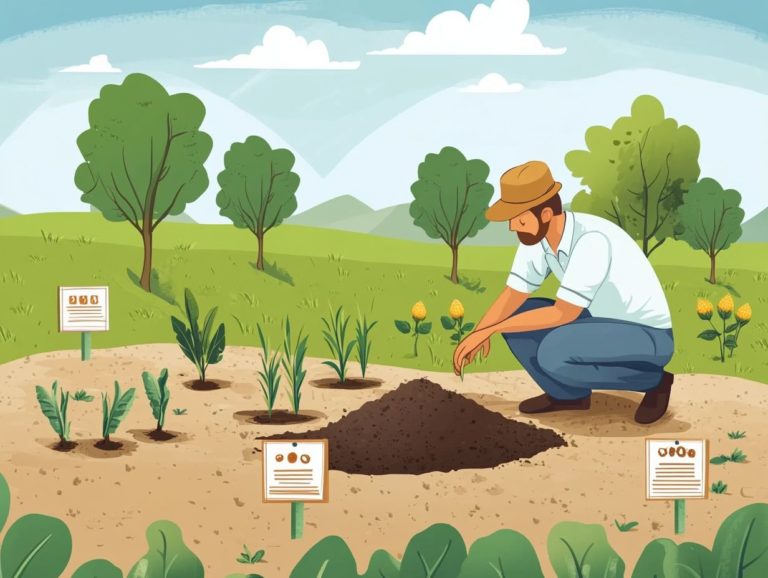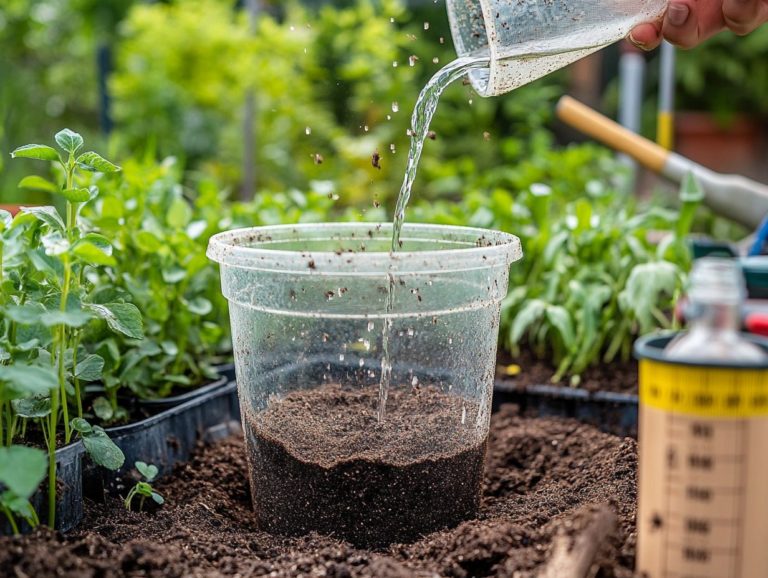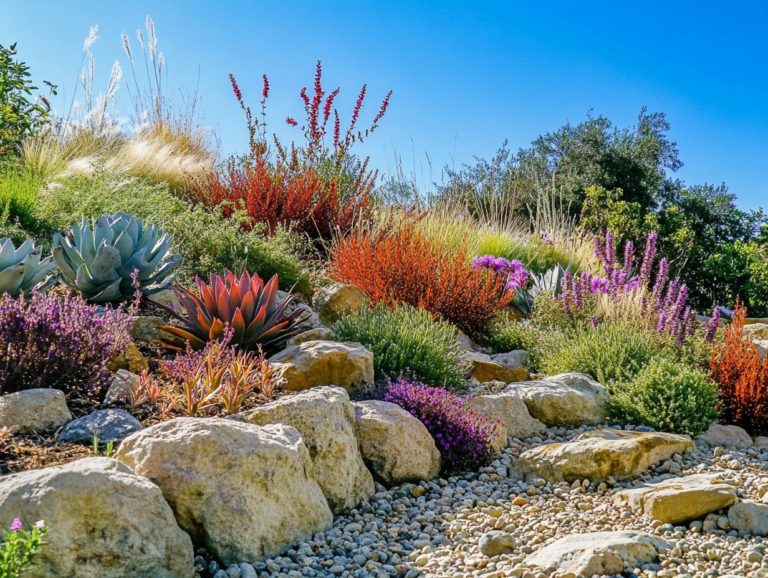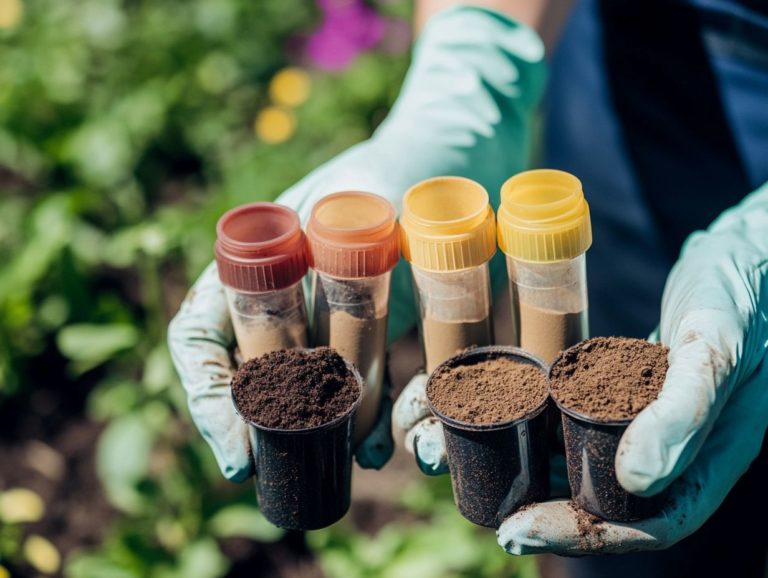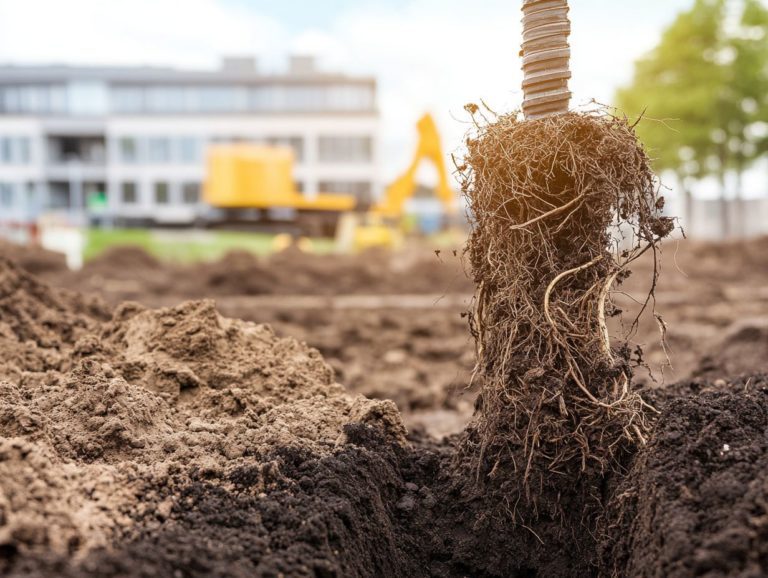5 Organic Mulches for Water Conservation
In today’s world, where water conservation is paramount, utilizing organic mulches can truly revolutionize your garden.
From shredded leaves to wood chips, these natural materials not only enhance the beauty of your landscape but also play a crucial role in retaining moisture and nourishing the soil.
This article delves into five effective organic mulches and their myriad benefits, along with best practices and common pitfalls to avoid, including mulch thickness and mulch application.
Explore how these eco-friendly options can elevate your gardening experience while remaining kind to the environment.
Contents
- Key Takeaways:
- 1. Shredded Leaves
- 2. Grass Clippings
- 3. Straw
- 4. Wood Chips
- 5. Compost
- What Are the Benefits of Using Organic Mulches for Water Conservation?
- Frequently Asked Questions
- 1. What are the benefits of using organic mulches for water conservation?
- 2. How do organic mulches conserve water?
- 3. What are some examples of organic mulches that can be used for water conservation?
- 4. How thick should organic mulches be applied for maximum water conservation?
- 5. Do organic mulches need to be replaced regularly to maintain their water conservation benefits?
- 6. Are there any other benefits of using organic mulches besides water conservation?
Key Takeaways:
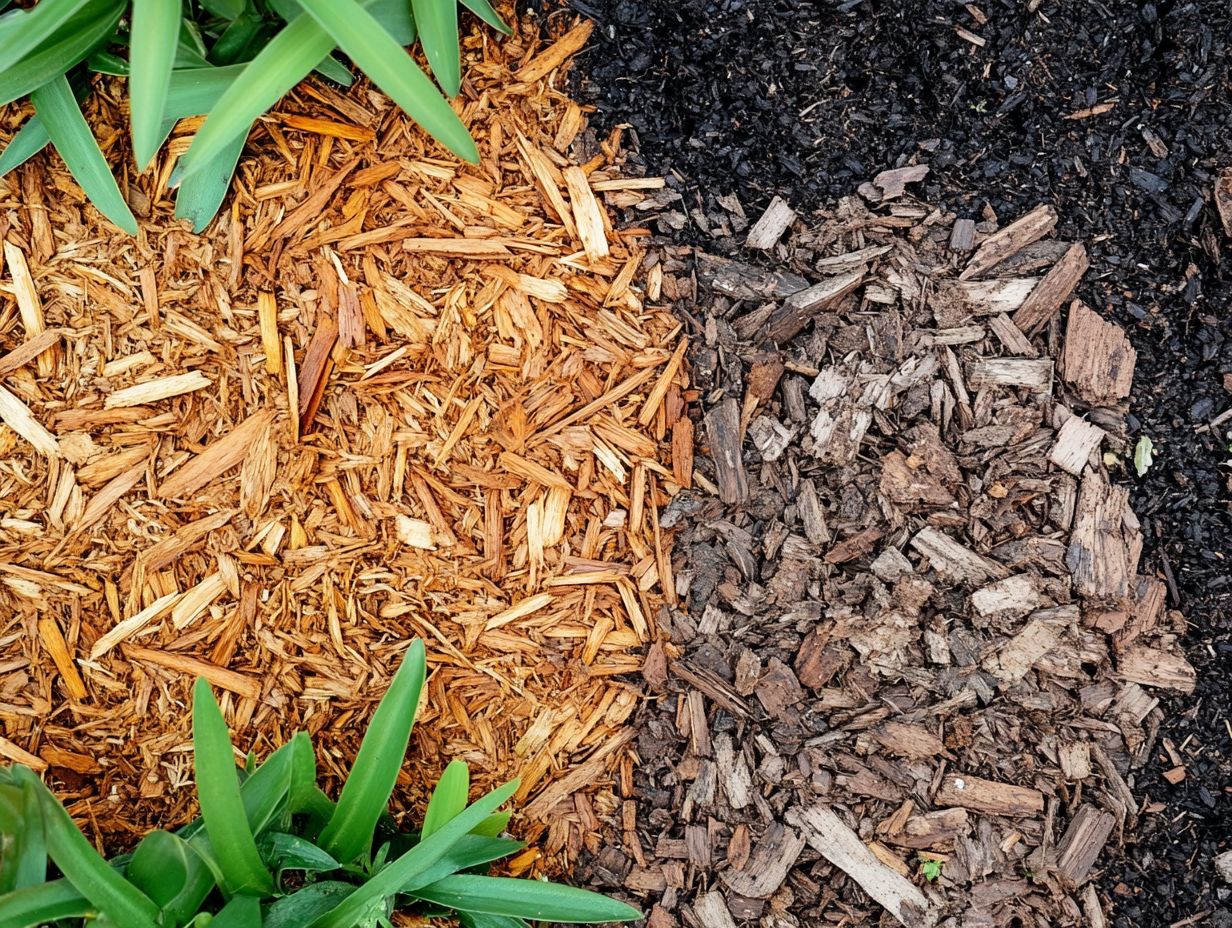
- Organic mulches, such as shredded leaves and grass clippings, can help conserve water by reducing evaporation and retaining soil moisture, making them a key strategy in water conservation.
- Using organic mulches correctly, like applying a 2-3 inch layer and avoiding piling against plant stems, can maximize their water conservation benefits.
- In addition to saving water, organic mulches can improve soil health, prevent weed growth, and reduce the need for chemical fertilizers.
1. Shredded Leaves
Shredded leaves are an exceptional choice for organic mulch. They offer a wealth of benefits for soil quality and moisture retention. It s no wonder they re favored by eco-conscious gardeners and landscapers alike.
This natural material not only supports plant growth but also adds a touch of rustic charm to your garden, creating an attractive soil covering.
When you shred leaves, they break down more rapidly than whole leaves, speeding up the breaking down process. This process enriches your soil with essential nutrients, enhancing its overall health and structure, crucial for keeping harmful insects away from your plants and plant growth.
As they decompose, shredded leaves contribute to moisture retention, keeping your soil consistently hydrated and minimizing the need for frequent watering. The layers of shredded leaves also act as an effective barrier against weeds, blocking sunlight and making it challenging for them to establish roots.
This mulch also regulates temperature, insulating the soil during extreme weather conditions, which is essential for maintaining drought resistance. If you re thinking about incorporating shredded leaves into your gardening routine, aim to apply a layer of 2 to 3 inches and refresh it annually to maintain both its effectiveness and appearance.
2. Grass Clippings
Grass clippings are an excellent choice for organic mulch, readily available and packed with nitrogen. They help conserve moisture, enhance soil insulation, and promote vigorous plant growth in your garden.
Their fine texture facilitates effective decomposition, which ultimately benefits your soil’s health and structure over time. Beyond enriching the soil with essential nutrients, this natural mulch acts as a formidable barrier against weeds, suppressing their growth and reducing your reliance on herbicides.
Apply grass clippings in a layer of one to two inches. This keeps them from matting and allows water to soak in.
Consider the aesthetics of your garden as well. A quick light raking can enhance the visual appeal and distribute the clippings evenly, allowing them to blend seamlessly with your surrounding landscape while still delivering all those fantastic benefits.
Don’t miss out on the benefits of shredded leaves; start using them today!
3. Straw
Straw is often underestimated. It acts as a great organic mulch and effectively holds moisture.
It also provides a reliable barrier against weeds, which helps control pests and supports healthy plant growth. Its lightweight nature makes it easy to use while insulating the soil.
This versatile material boosts drought resistance by reducing evaporation. As it decomposes, it enriches the soil, creating a vibrant ecosystem beneath the surface.
If you need quality straw, check local farms, garden centers, or online marketplaces for different types of mulch tailored to your gardening needs.
When applying straw, aim for a layer of 2 to 4 inches. This thickness maximizes benefits without compacting too tightly, which could block water from soaking in.
You can also boost soil health by mixing straw into compost piles.
4. Wood Chips
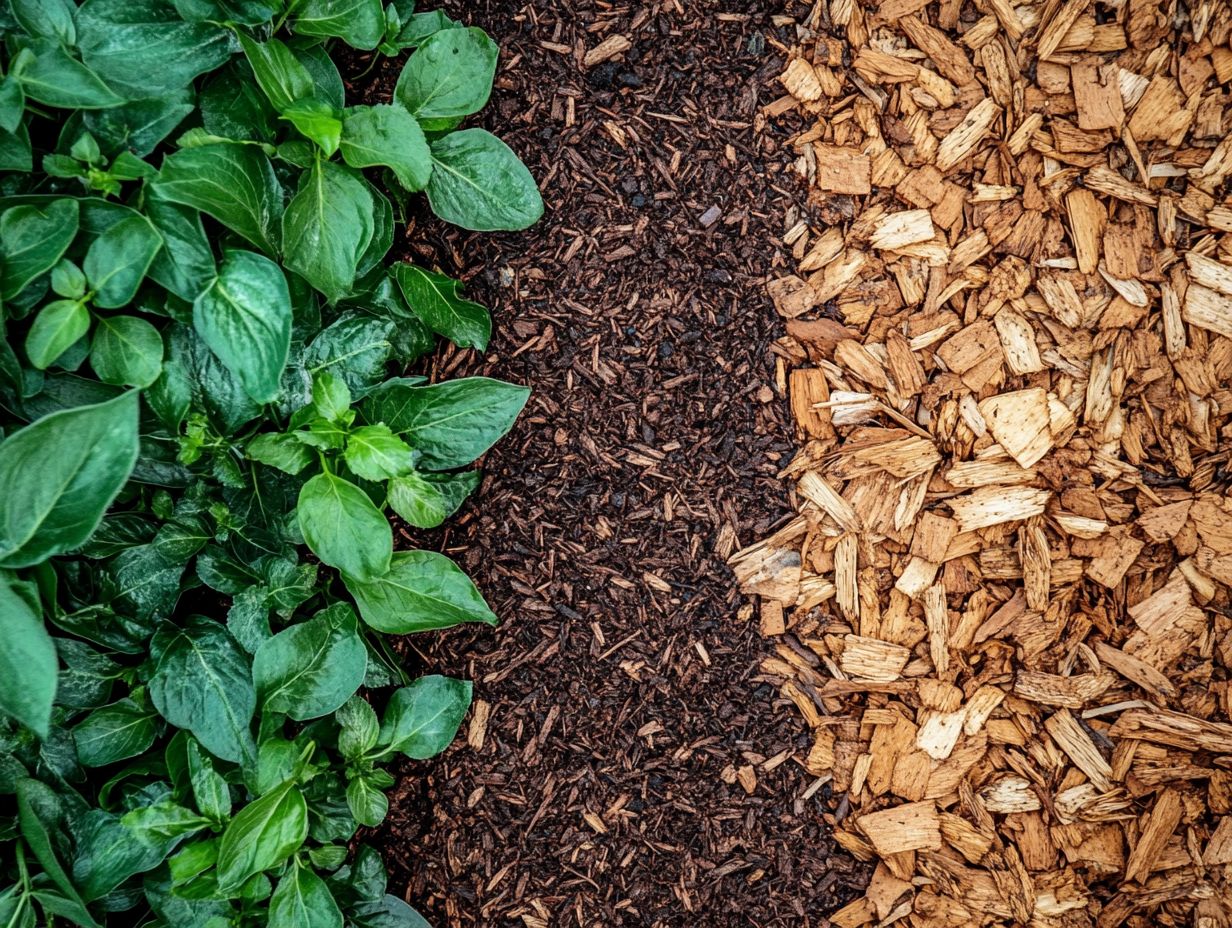
Wood chips are practical and improve your garden’s appearance. They are a top choice for decorative mulch and enhance soil health.
They help retain moisture and release nutrients as they break down, creating a healthier garden while keeping weeds away.
You ll find various wood chips available, including hardwood, softwood, and bark mulch. Each type offers unique benefits and decomposes at different rates.
Hardwood chips are slow to break down, enriching the soil over time. Softwood chips decompose faster, providing a quick boost of organic matter for healthier plants.
The visual appeal of wood chips can enhance a variety of garden styles, from rustic to modern. Choosing the right type will give you both soil health benefits and a beautiful outdoor space.
5. Compost
Think of compost as your garden s best friend! It is a powerful organic mulch that enriches soil health by releasing essential nutrients.
Compost boosts plant growth and resilience against pests, making it vital for sustainable gardening.
It improves soil structure, helping retain moisture and making garden maintenance easier.
When applied correctly, compost helps regulate soil temperature, giving your plants an advantage in different weather conditions. You can use it in raised beds or container gardens for flexibility.
As compost breaks down, it encourages helpful tiny organisms that are key in pest control, improving soil health and plant resilience.
By mastering application techniques like layering or mixing, you can maximize compost’s benefits, ensuring your garden thrives while being environmentally friendly and self-sustaining.
What Are the Benefits of Using Organic Mulches for Water Conservation?
Utilizing organic mulches for water conservation is an essential practice that boosts moisture retention in your soil. It also significantly enhances soil quality, fostering a resilient environment for your plants and improving garden sustainability.
This method helps plants survive dry spells, reduces the frequency of watering, and champions overall garden sustainability.
Different types of organic mulches, like straw, wood chips, and grass clippings, each present unique benefits in terms of soil insulation and temperature regulation. For example, straw offers excellent insulation, helping to keep soil temperature stable while minimizing evaporation.
Wood chips decompose slowly, improving soil structure and providing a gradual release of nutrients over time. Grass clippings, rich in nitrogen, promote microbial activity, enriching the soil even further.
By understanding these advantages, you can choose the right organic mulch to cultivate a thriving ecosystem that nurtures healthier plants and optimizes water usage.
How Do Organic Mulches Help Conserve Water?
Organic mulches are crucial for conserving water in your garden. They enhance moisture retention and provide valuable soil insulation, effectively reducing evaporation from the soil surface.
This practice not only fosters healthier plant growth but also supports effective water conservation strategies in both urban and rural gardening.
Using materials like straw, bark chips, or shredded leaves allows you to easily create a protective layer over the soil. This layer helps maintain optimal moisture levels.
For example, straw mulch is particularly beneficial in vegetable gardens, as it allows the soil to hold onto water while keeping pesky weeds at bay. This prevents them from competing for moisture.
Wood chips are great for perennial flower beds. They break down slowly, enriching the soil over time while decreasing the need for frequent watering.
To truly maximize the benefits of organic mulches, integrate them into your gardening practices. Layering them around plant bases or incorporating them into your compost can significantly enhance moisture retention.
This will also improve soil quality and boost soil health, creating a thriving environment for a diverse array of plant species.
What Are the Best Practices for Using Organic Mulches?
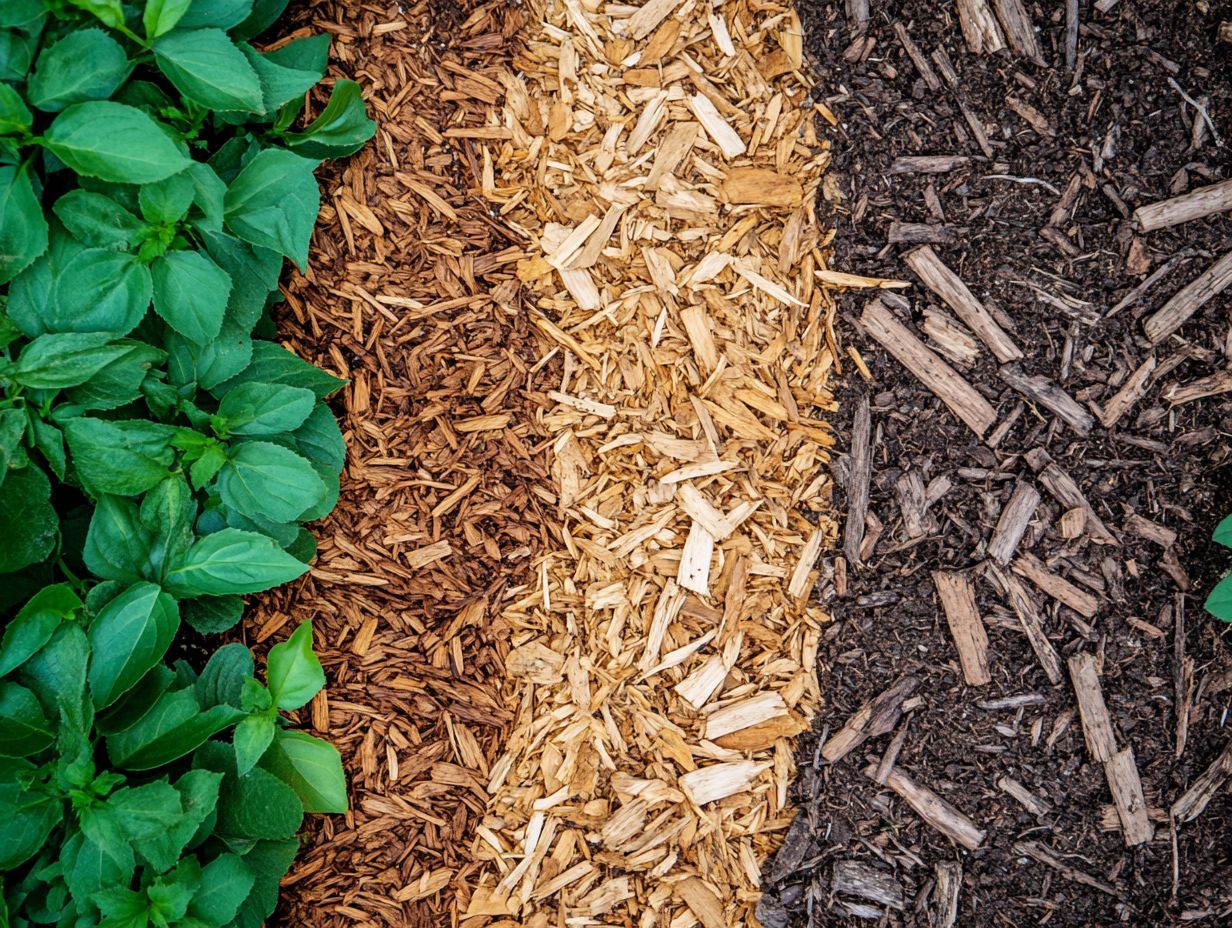
Effective use of organic mulches involves following best practices that optimize your mulch application and enhance weed control. This includes selecting the right type of mulch and ensuring the appropriate thickness for maximum moisture conservation.
To achieve the best results, time your mulch application for cooler months when the soil temperature remains stable. This minimizes stress on your plants.
A thickness of two to four inches is generally recommended, striking a balance between moisture retention and air circulation.
Different types of organic mulches like shredded bark, straw, or grass clippings bring unique benefits. It’s essential to choose one that suits your specific plants and climate conditions.
Regular maintenance is key; replenish the mulch as it decomposes and keep an eye out for pests. This will ensure its effectiveness.
Evaluate how well your mulching techniques are working by observing plant health and soil moisture levels. This will allow you to make adjustments as necessary.
Have you tried using straw mulch? Act now to protect your garden!
What Are the Common Mistakes to Avoid When Using Organic Mulches?
When you’re using organic mulches in your garden, it s easy to stumble upon common mistakes that can really undermine their effectiveness. Take improper mulch thickness, for instance it can lead to poor weed control and negatively impact soil quality. Recognizing these pitfalls is key to achieving the best results in your garden maintenance and plant health.
If you don’t allow your mulch to break down correctly, you risk reduced nutrient availability for your plants. This can throw your garden ecosystem out of balance. To sidestep these issues, it’s essential to layer organic materials at the right depth usually between two to four inches while ensuring they permit adequate moisture penetration.
Regularly assessing your soil’s health is a smart move. Testing its pH and organic matter levels will guide any necessary adjustments in your mulching techniques. By understanding these common errors and their repercussions, you can create a flourishing environment for your plants, ultimately enhancing their growth and resilience.
How Can Organic Mulches Benefit the Soil?
Organic mulches offer a wealth of benefits to your soil, enhancing its health through nutrient release, improved moisture retention, and effective insulation. Together, these advantages create a thriving ecosystem that supports robust plant growth. By incorporating these mulches into your gardening practices, you can enrich your soil while embracing a sustainable approach.
Utilizing organic materials such as wood chips, straw, or grass clippings not only enriches the soil as they decompose but also cultivates a flourishing habitat for beneficial microorganisms and earthworms. For instance, wood chips break down gradually, releasing nutrients over time and helping maintain consistent moisture levels. Similarly, straw acts as a moisture-retaining barrier while providing shelter for beneficial insects that assist in pest control.
Choosing the right mulch can supercharge your soil quality, promote nutrient cycling, and support a diverse biological community, ultimately leading to healthier, thriving plants.
What Are the Environmental Benefits of Using Organic Mulches?
The environmental benefits of using organic mulches extend far beyond your garden; they play a crucial role in controlling soil erosion, promoting eco-friendly gardening practices, and contributing to sustainable gardening methods, which together foster healthier ecosystems. By implementing these practices, you enhance biodiversity and improve the overall quality of the environment.
Organic mulches are essential elements in urban gardening initiatives, aiding those in city settings to tackle the challenges of poor soil quality and water scarcity. As these mulches break down, they enrich the soil with vital nutrients that enhance plant health, all while reducing reliance on chemical fertilizers. This natural approach not only conserves water by retaining moisture but also minimizes runoff, ensuring that crucial nutrients are absorbed rather than washed away.
Start using organic mulches today to make a powerful impact on our environment! You can make significant strides toward a more sustainable urban landscape, benefiting both your local environment and the community at large.
Frequently Asked Questions
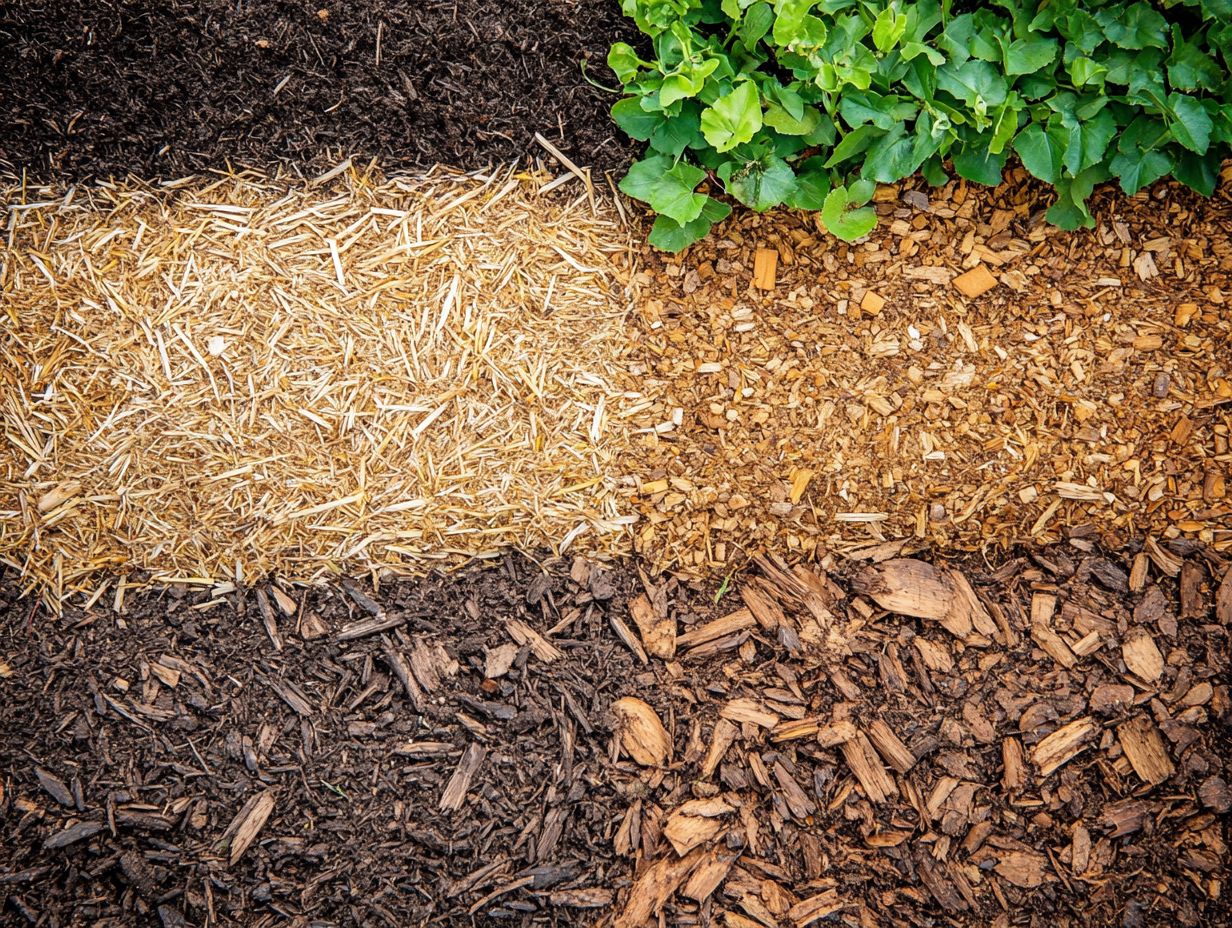
1. What are the benefits of using organic mulches for water conservation?
Organic mulches help retain moisture in the soil, reducing the need for frequent watering. They also prevent soil erosion and suppress weed growth, ultimately saving water and promoting a healthier environment for plants.
2. How do organic mulches conserve water?
Organic mulches act as a barrier between the soil and the sun, reducing evaporation and keeping the soil cool and moist. They also improve soil structure, allowing it to better absorb and retain water.
3. What are some examples of organic mulches that can be used for water conservation?
Some examples of organic mulches include shredded bark, straw, grass clippings, leaves, and compost. These materials are all natural and readily available, making them a sustainable option for water conservation.
4. How thick should organic mulches be applied for maximum water conservation?
For water conservation, apply organic mulches to a depth of 2-4 inches. This depth retains moisture while letting air and nutrients get to the roots.
5. Do organic mulches need to be replaced regularly to maintain their water conservation benefits?
Organic mulches need replenishing every 1-2 years to keep their water conservation benefits. Don t wait too long! This timing may vary based on the type of mulch and local climate conditions.
6. Are there any other benefits of using organic mulches besides water conservation?
Absolutely! Organic mulches enrich the soil as they break down, promoting healthy plant growth.
They also attract beneficial insects and organisms that help with pest control and improve soil health.

